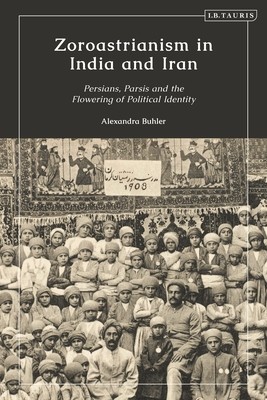
- We will send in 10–14 business days.
- Author: Alexandra Buhler
- Publisher: I. B. Tauris & Company
- ISBN-10: 0755601602
- ISBN-13: 9780755601608
- Format: 15.6 x 23.4 x 1.9 cm, kieti viršeliai
- Language: English
- SAVE -10% with code: EXTRA
Reviews
Description
In the nineteenth century, a great number of Zoroastrians emigrated from Iran to India. The subsequent importance of the cultural, religious and political ties between the Zoroastrian communities of Iran and the Zoroastrians communities of India has long been recognised. But despite this, there has been very little scholarly attention paid to this transnational relationship or the networks that existed.
This book examines the Zoroastrian community in the late Qajar and early Pahlavi period beyond the borders of Iran to trace this Parsi-Persian relationship. A major theme is the increase in philanthropy directed to the Zoroastrians of Iran by the Parsis and the involvement of the British in encouraging Parsi feelings of patriotism towards Iran. The book shows that not only were Parsis effected by events taking place in Iran, they also contributed to the broader change in attitudes towards Zoroastrians in that country. Using a variety of original sources from Britain, India and Iran, Alexandra Buhler looks at the political, legal, and social position of Zoroastrians in Iran and how different events impacted their attitudes as well as the attitudes of Parsis towards their ancestral homeland. Of particular significance, this book shows, are the seminal years of the Iranian Constitutional Revolution (1906-11) and the rise in the glorification of the pre-Islamic past, which culminated in the state nationalism expounded by Reza Shah. These political moments had a profound impact on how Zoroastrians in India felt about their future in the country and reveal a complex web of relations between the Parsis, the Zoroastrians of Iran, and the British.EXTRA 10 % discount with code: EXTRA
The promotion ends in 23d.14:17:51
The discount code is valid when purchasing from 10 €. Discounts do not stack.
- Author: Alexandra Buhler
- Publisher: I. B. Tauris & Company
- ISBN-10: 0755601602
- ISBN-13: 9780755601608
- Format: 15.6 x 23.4 x 1.9 cm, kieti viršeliai
- Language: English English
In the nineteenth century, a great number of Zoroastrians emigrated from Iran to India. The subsequent importance of the cultural, religious and political ties between the Zoroastrian communities of Iran and the Zoroastrians communities of India has long been recognised. But despite this, there has been very little scholarly attention paid to this transnational relationship or the networks that existed.
This book examines the Zoroastrian community in the late Qajar and early Pahlavi period beyond the borders of Iran to trace this Parsi-Persian relationship. A major theme is the increase in philanthropy directed to the Zoroastrians of Iran by the Parsis and the involvement of the British in encouraging Parsi feelings of patriotism towards Iran. The book shows that not only were Parsis effected by events taking place in Iran, they also contributed to the broader change in attitudes towards Zoroastrians in that country. Using a variety of original sources from Britain, India and Iran, Alexandra Buhler looks at the political, legal, and social position of Zoroastrians in Iran and how different events impacted their attitudes as well as the attitudes of Parsis towards their ancestral homeland. Of particular significance, this book shows, are the seminal years of the Iranian Constitutional Revolution (1906-11) and the rise in the glorification of the pre-Islamic past, which culminated in the state nationalism expounded by Reza Shah. These political moments had a profound impact on how Zoroastrians in India felt about their future in the country and reveal a complex web of relations between the Parsis, the Zoroastrians of Iran, and the British.

Reviews